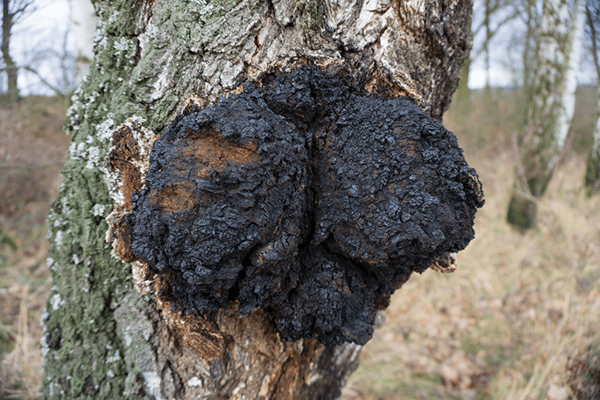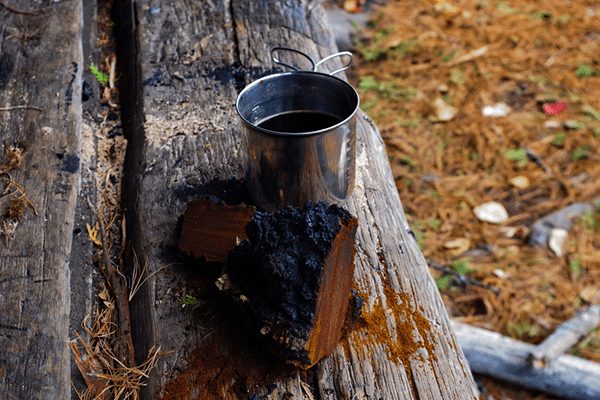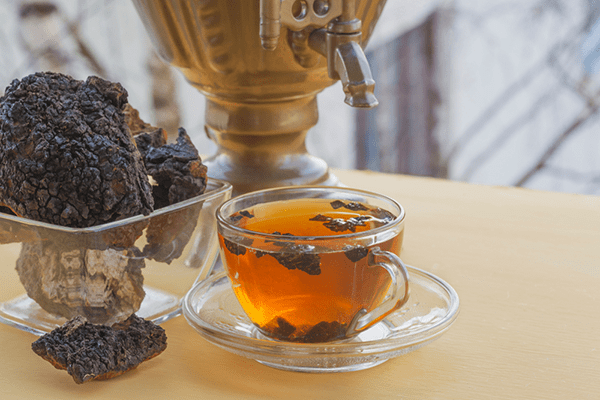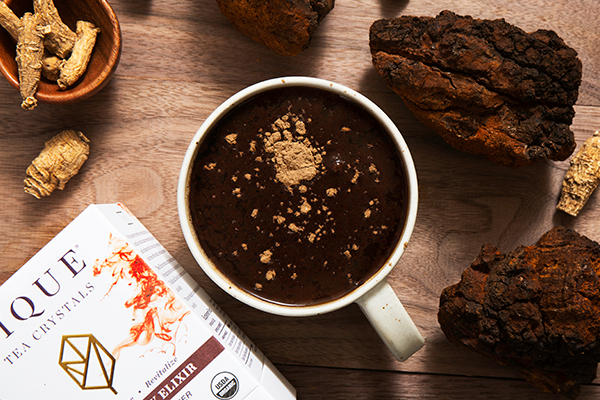- Chaga is actually considered a parasite; it leaches nutrients from its host tree.
- This incredibly unattractive fungus contains is one of the most healthful foods on the planet— it contains 31 times more antioxidants than blueberries!
- Chaga tea has been enjoyed for centuries by indigenous populations and used in traditional herbalism to support immune health, cardiovascular health, a balanced stress response, and more.
Chaga mushrooms (Inonotus obliquus) are finally finding their way into the much-deserved spotlight, primarily due to their potentially beneficial effects. From chaga coffee, to chaga tea, to fancy new chaga supplements – these superfood mushrooms are popping up everywhere.
You may be wondering what all the buzz is about? Can mushrooms really be that impactful on your health? You bet they can.
Before we jump into the health benefits, let’s learn some interesting facts about these mushrooms.
What Are Chaga Mushrooms?
Where do chaga mushrooms come from?
Chaga likes to grow in cold climates throughout the northern hemisphere, like Siberia, Russia, Scandinavia, Canada, and some parts of North America and the United States. They grow mainly on birch trees and can stick around for 10 to 20 years until they become a hard mass, or conk, attached to the tree.
Although these mushrooms may not be the most attractive (the conk resembles burnt charcoal stuck to the tree trunk), the health benefits of their fruiting body more than makes up for their lack of points in the beauty contest.

They are a fungus after all.
Interestingly, despite its myriad of potential health benefits for humans, chaga is considered a parasite to the trees it grows on because it needs its host to survive. Because of this, you should never harvest chaga from a dead tree.
History Of Chaga Mushrooms
Chaga mushrooms have been used for hundreds of years in Russia and Northern European countries as part of traditional herbalism and folk medicine. In fact, the word chaga is an old Russian word for “mushroom.”
It’s even rumored that the use of chaga as a beneficial mushroom goes all the way back to Roman times, with Romans importing birch from Europe.
It was traditionally prepared by grating the mushroom down to a fine powder and then brewing the chaga mushroom powder as an herbal tea.

6 Health Benefits Of Chaga
-
- Supports Immune Health
- Supports Healthy Anti-Inflammatory Response
- Supports Heart Health
- Supports Healthy Blood Sugar Level
- Supports a Healthy Stress Response
- High in Antioxidants
You have to respect the chaga mushroom; it doesn’t have an easy life. Can you imagine being stuck to a tree in freezing cold weather for years on end just trying to survive?
Just like you need a healthy immune system, plants need the same thing to ensure their own survival. The benefit to you: they become loaded with biological chemicals that can enhance not only their lives but yours as well!
Here are just a few of the health-promoting constituents found in chaga (25)(26)(27)(28):
-
- Beta-glucans
- Antioxidants
- Melanin
- Triterpenes
- Polyphenols
Okay, now that you’re a chaga mushroom history expert, let’s get into the health benefits of this odd yet lovable fungus.
1. Supports Immune Health
A healthy immune system is a cornerstone of a healthy body and one of chaga’s most well-known health benefits is its ability to support healthy immune function.
Compounds called polysaccharides that are found in chaga have precisely this benefit. (1)(2) These long chains of carbohydrate molecules also help support the body’s conversion of food into energy for a caffeine-free energy boost.
2. Supports Healthy Anti-Inflammatory Response
Supporting a healthy inflammatory system is crucial if you want to keep your body functioning optimally. Mushrooms like chaga have been used for thousands of years to support immune health and inflammation systems, and continue to be an area of study for researchers. (11)
Research on animals and test-tube studies show the chaga mushroom can help support healthy inflammation systems and healthy immune cells in mice and rats. (12) (13)
3. Supports Heart Health
Keeping this vital organ happy and healthy is key to a long and vibrant life. (17)
Chaga mushrooms may support your cardiovascular health in several important ways, including supporting healthy blood cholesterol and triglycerides. (18) (21)
Inflammation is also strongly linked to heart health. Chaga contains a number of health-promoting compounds that not only support your immune system but may also support your inflammatory system. (21)
4. Supports Healthy Blood Sugar Levels
Normal blood sugar levels are linked with overall health. Studies find that chaga mushroom supplementation is linked to healthy blood sugar levels in mice. (23)(24)
5. Supports a Healthy Stress Response
Chaga mushrooms are part of a category of plants called adaptogens. Adaptogens have unique properties that help support the body’s ability to cope with the effects of physical and emotional stress. When taken consistently over a period of weeks or months, adaptogens may help support healthy stress response and promote feelings of calm and balance.
6. High in Antioxidants
The chaga mushroom has one of the highest ORAC scores of any food— 31 times higher than blueberries! ORAC stands for “oxygen radical absorbent capacity” and it measures the antioxidant activity of a food. The higher the score, the better a food’s ability to support the body against the harmful effects of free radicals and oxidative stress.
How To Use Chaga
Now that you’ve learned about all the ways that chaga can benefit your health, you’re probably wondering how to incorporate this fabulous mushroom into your life.
There are a few different ways you can incorporate chaga into your routine.
If you’re a coffee or tea drinker, adding chaga powder or chaga extract can make a great addition to your morning cup. You can also simply add it to hot water along with a dash of cinnamon.
If you’re a fan of frothier brews, try one of our personal favorites, like this Chaga Chai Latte or Frothy Chaga Mexican Hot Chocolate.
If you’re not into the earthy flavor of chaga, no worries. Lucky for you, more and more companies are jumping on the chaga bandwagon and creating chaga teas, tinctures, supplements, and chaga mushroom extracts which all make it super easy and painless to get this superfood mushroom into your daily routine.
Of course, when choosing a chaga tea, tincture, or supplement, you want to make sure you’re getting the highest quality.
How to Select a Quality Chaga
Chaga mushrooms need a live host in order to grow and maintain their nutrient quality. If chaga is harvested from a dead tree, its nutrients will be depleted. This mushroom can also absorb pollution, so you want to make sure that the chaga you’re buying was wild-harvested away from heavily populated areas.
If you’re a real do-it-yourselfer and you want to harvest your own chaga to make your own chaga mushroom tea — more power to you! Here’s our recommendation for a high-quality Chaga Mushroom Tea:

Pique Chaga Energy Elixir
Banishes fatigue. Awakens the senses. Refreshes the mind, body and soul.
How to Make Chaga Tea (From Scratch!)
First, harvest the chaga from a living tree and then grind it down into a fine powder to release the active compounds.
Second, steep the powdered chaga in cold water (1-2 teaspoons per 8-ounces of water). After about an hour, slowly bring to a boil— the slow temperature change of the water extracts out the active constituents.
Simmer for an hour, then strain out the chaga and enjoy!

Still curious about this bizarre super-shroom? Here are answers to some of the most common chaga questions.
Frequently Asked Questions About Chaga:
How much Chaga should you drink per day?
There is no standardized form or recommended dosage for chaga mushrooms. However, 1 to 2 8 ounce cups of brewed chaga tea are generally recognized as a healthful addition to a wellness routine. You should consult your healthcare provider if you have questions regarding specific dosage for chaga supplements or tea, or if you are taking any medications.
Does Chaga give you energy?
Chaga does not have caffeine so it won’t keep you awake at night or cause the caffeine “jitters.” It does have polysaccharides that help support the body’s conversion of food into energy for a natural, caffeine-free energy boost. But its adaptogenic properties can help promote calm and relaxation. Chaga tea can really be enjoyed at any time of day.
Does Chaga have side effects?
Chaga is generally safe and well-tolerated by most people. However, it can interact with certain medications. You should consult with your healthcare professional before including chaga (or any other herbal plant) in your wellness routine, especially if you’re currently taking any medications.
Does Chaga get you high?
The chaga mushroom has adaptogenic properties that promote calm and help your body adapt to stress. This is not to be confused with hallucinogenic mushrooms which are sold illegally as recreational drugs due to their mind-altering properties.
What does Chaga tea taste like?
Chaga has a unique earthy taste that is nothing like the mushrooms found in grocery stores. When brewed, chaga tea will have this same distinct earthiness. Some chaga is slightly bitter, but this usually indicates lower quality. Chaga that is wild-harvested from a live tree in a native growing region has a smooth flavor, perhaps even a subtle sweetness.
Final Thoughts
One of the most antioxidant-rich foods on the planet, the chaga mushroom boasts many health benefits.
The superfood mushroom may support healthy immune function, heart health, balanced blood sugar, energy, and more.
There are many ways to get the benefits of chaga mushroom extract: chaga tea, supplements, or even tinctures.
No optimal dosage has been established. Always talk to your doctor if you have concerns about possible side effects or interactions with medications.







